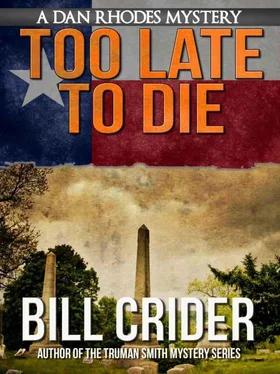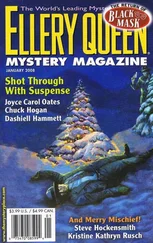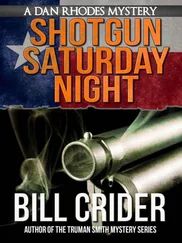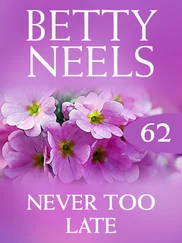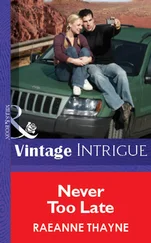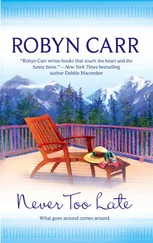Bill Crider - Too Late to Die
Здесь есть возможность читать онлайн «Bill Crider - Too Late to Die» весь текст электронной книги совершенно бесплатно (целиком полную версию без сокращений). В некоторых случаях можно слушать аудио, скачать через торрент в формате fb2 и присутствует краткое содержание. Год выпуска: 0101, Издательство: Crossroad Press, Жанр: Полицейский детектив, на английском языке. Описание произведения, (предисловие) а так же отзывы посетителей доступны на портале библиотеки ЛибКат.
- Название:Too Late to Die
- Автор:
- Издательство:Crossroad Press
- Жанр:
- Год:0101
- ISBN:нет данных
- Рейтинг книги:5 / 5. Голосов: 1
-
Избранное:Добавить в избранное
- Отзывы:
-
Ваша оценка:
- 100
- 1
- 2
- 3
- 4
- 5
Too Late to Die: краткое содержание, описание и аннотация
Предлагаем к чтению аннотацию, описание, краткое содержание или предисловие (зависит от того, что написал сам автор книги «Too Late to Die»). Если вы не нашли необходимую информацию о книге — напишите в комментариях, мы постараемся отыскать её.
Too Late to Die — читать онлайн бесплатно полную книгу (весь текст) целиком
Ниже представлен текст книги, разбитый по страницам. Система сохранения места последней прочитанной страницы, позволяет с удобством читать онлайн бесплатно книгу «Too Late to Die», без необходимости каждый раз заново искать на чём Вы остановились. Поставьте закладку, и сможете в любой момент перейти на страницу, на которой закончили чтение.
Интервал:
Закладка:
Chapter 3
Driving back to Clearview, Rhodes thought about his conversations with Clinton and Barrett. Both men were obviously nervous, both on edge, but that didn’t necessarily mean anything. Rhodes knew that anyone involved in the investigation of a serious crime was likely to feel nervous. Everyone seemed to feel guilty about something or other, even if it wasn’t something directly or even indirectly related to the crime under investigation. He would trust his instincts and keep on probing, asking questions, talking to anyone involved in the case, and eventually he’d find out what he wanted to know. He was sure of that.
He thought about some of the questions he would have to ask as he drove the county car toward Clearview, oblivious of the bluebonnets that grew in state-planned profusion by the side of the road. He was not so wrapped up in his thoughts, however, that he missed the huge sign, done in red, white, and blue, that advertised Ralph Claymore’s candidacy for sheriff. It was firmly affixed to a farmer’s fence. If it had been on public property, Rhodes would have pulled it down.
When Rhodes got back to the jail, Hack was ready with all the news. “Those two guys that Johnny brought in have walked. Their wives got up their bail money.”
“I figured on that,” Rhodes said. “We probably don’t have to worry too much about any lawsuit from those two. They’re glad to be gone.”
“Right. Buddy Reynolds brought in a couple a while ago, by the way.”
Hack paused. He had a way of wanting Rhodes to draw things out of him.
“A couple of birds.
“Birds? What kind of birds?”
“Lovebirds,” Hack said. “Tried to set up housekeepin’ in the city park. Trouble was, all they had was a quilt. Charged ‘em with adultery.”
Rhodes laughed. “Buddy always has been a narrow-minded devil. What happened?”
“Well, it turns out they’re married, but not to each other. So we called the husband and wife and the district judge. The judge told us to release the lovebirds into their spouses’ custody and he’d have them make an appearance before him later.”
“Where’s Buddy now?”
“‘We got a call about a wreck over toward Milsby. Buddy’s on the way over to help out the highway patrol. Don’t think it’s a bad one, though. “
“Good,” Rhodes said. The mention of Milsby had reminded him that he was supposed to appear at a candidates’ forum and cake auction there that night. It wasn’t something he was looking forward to, but he had to be there. Ralph Claymore sure would. “What about Billy Joe?”
“He seems to be doing OK. Ate a pretty good lunch. Just sits on the cot most of the time, humming to himself.”
“Any word from the state boys on that shirt of his?”
“Hell, Sheriff, you know better than that. If we hear within a week, we’ll be doing good.”
“Good’s not good enough in this case. Give them a call and tell them it’s an emergency. Same with the autopsy on Jeanne Clinton.”
Hack looked skeptical. “I’ll give it a try,” he said, “but I wouldn’t count on it doin’ any good.”
“Try anyway,” Rhodes told him. “I’m going over to the house to get ready for that forum tonight. Put any important calls through to me there, but save the routine stuff for Buddy or Bob. Where’s Bob, by the way?”
“We got a call from some woman out by the rock crusher, says her kid found a pickup stripped and abandoned in the field out behind their house. Might be the one that was stole from Larry Harper night before last.”
“Who’s going to tow it in?”
“Five Star.”
“OK. Tell you what. I want Buddy and Bob to take all the routine stuff. I’ll probably be through at the cake auction before they go off shift, but tell them I’ll be devoting all my time to the Clinton case if I don’t see them.”
Hack nodded. “Right. Sheriff, I’ll do that for sure.” As Rhodes was leaving, Hack started for the radio.
Clearview was a town of about eight thousand people, and like any town of that size it had clearly established neighborhoods. Some were new, and the houses in them were large and expensive. A few back yards even had swimming pools in them, and the lawns were kept green and trimmed by black or Chicano yardmen. The people living in these neighborhoods were generally fairly young, many of the men holding some sort of executive position at the cable company or the decorative products factory, both located in the optimistically named “industrial park” area of the town. So far these were the only two industries of any size located there, but the city council members had great hopes for the future.
There were large and impressive houses in other neighborhoods, too, but these were older homes, huge, two-story stone structures resembling, somewhat, small castles or lavish haciendas. They had been built in the 1920s and 1930s, when Clearview had experienced a minor oil boom. The boom hadn’t lasted for very long, but it had proven quite profitable for some of the landowners at the time. Their descendants lived on in their old homes, quite comfortable, insulated for the most part from the daily life of the community by their money and their social position.
Quite the reverse was true in the area called “the flats.” Most of the black and brown population lived there in board shacks with hard-packed dirt yards. Their porch roofs sagged, and the yard furniture often consisted of an old automobile seat or a decrepit living-room couch cast off by one of the well-to-do families from the better neighborhoods. Small, ragged children could occasionally be seen sleeping outside on warm nights, sharing the buckled and sprung couch with a dog or a scrawny chicken.
Sheriff Dan Rhodes lived in none of these areas. He lived instead in an older part of the town that had once been quite respectable but which was now on the way down. Most of the yards were still neatly kept, and there were certainly more and larger trees than in the newer additions to the city’s residential sections, but many of the frame houses needed paint. Some had needed it for quite a while. Some could also have used new roofs, while others displayed wire screens that were rusted with age.
The house where Rhodes lived was about average for the block on which it was located. White paint on the wooden sides peeled only slightly. The cement sidewalk that ran from the front door to the street was slightly buckled, but no grass grew in the cracks. The shrubs around the house were neatly trimmed. In the front yard, a huge pecan tree shaded the freshly cut lawn.
Very little of this appearance was due to Rhodes’s own care. He hated yard work and would do almost anything to avoid it. But his daughter seemed to enjoy it, and he was glad she did. He didn’t mind living in a well-kept home. In fact, he liked it, as long as he didn’t have to do too much of the work.
He parked the county car in the driveway and walked to the front door. It was four o’clock, and Kathy would most likely be at home. Rhodes pushed open the front door and called her name.
“I’m in the kitchen, Dad,” she answered.
Rhodes walked back through the living room and a short hall to the kitchen, where his daughter was putting groceries from a sack into a white metal cabinet that stood against the wall next to an equally white refrigerator. She was twenty-three years old, not quite two years away from her college days at the state university in Huntsville where she had taken her degree in elementary education. After graduation she had gotten a job in Clearview to be close to her terminally ill mother, and after Claire Rhodes’s death eighteen months ago Kathy had remained at home to look after her father.
Читать дальшеИнтервал:
Закладка:
Похожие книги на «Too Late to Die»
Представляем Вашему вниманию похожие книги на «Too Late to Die» списком для выбора. Мы отобрали схожую по названию и смыслу литературу в надежде предоставить читателям больше вариантов отыскать новые, интересные, ещё непрочитанные произведения.
Обсуждение, отзывы о книге «Too Late to Die» и просто собственные мнения читателей. Оставьте ваши комментарии, напишите, что Вы думаете о произведении, его смысле или главных героях. Укажите что конкретно понравилось, а что нет, и почему Вы так считаете.
